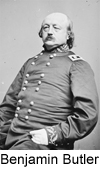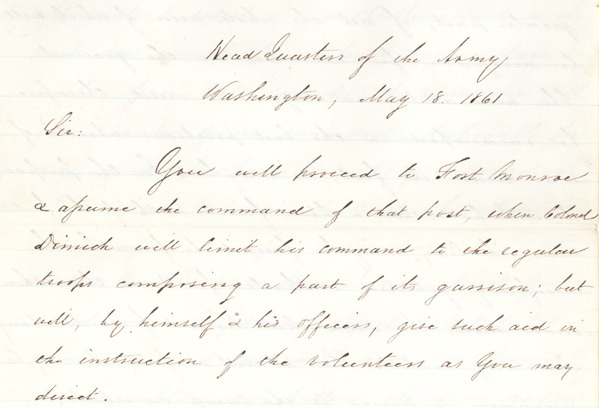
The President’s Message:
We are trying to build back membership, so bring a friend to the October
12th
meeting if possible. The
Round Table received a donation of the complete series of Time Life
books about the Civil War.
If you are interested in purchasing the entire series of books, please
email, call or see me at the meeting.
Gerridine LaRovere
October 12,
2022 Program:
Janell Bloodworth will be the speaker at the October 12th
meeting. The program will
be about Clara Barton who was one of the few women employed by the
Federal government before the War.
She felt that there were too many restrictions on women.
Clara was a superb horsewoman and a dead shot with a revolver yet
she could never become a soldier.
Her focus was on collecting food and hospital supplies for the
army as well as caring for wounded soldiers.
She met the love of her life on Hilton Head Island.
Clara never married, and Janell will tell us why.
September 14, 2022 Program:
Craig
Freis has in his collection of original Civil War memorabilia a letter,
dated May 18, 1861, written by Winfield Scott to
Benjamin
Butler. In it Scott gave
Butler his marching orders to take control of Fort Monroe and all the
Volunteers that were being sent to the Fort.
Craig came to possess this letter by being the successful bidder
in an auction held over the Internet by
One Of A Kind Collectibles,
LLC.
The presentation began with a brief discussion of Scott whose Army
tenure stretched from the War of 1812, though the War with Mexico, until
the Civil War. “Old Fuss &
Feathers” held the highest rank in the Army until John Pershing was made
General of the Armies. When
Scott commanded Butler to take command of Ft. Monroe it may have been to
get Butler out of the way.

Butler was described by pointing out may of his short comings that were
expounded by his political enemies, both in the Army, in Washington, DC,
and throughout the South.
Most of the time Ben landed on his feet as he had supporters in high
places up to and including the White House.
Ft. Monroe commanded a key strategic possession on Chesapeake Bay at the
confluence of the Bay and the James River.
It was in the shape of a six sided star and boasted 412 cannons.
The current structure was completed in 1834 and stood on the site
a fortifications going back to the 17th
century. Although located
in tidewater Virginia, the North never lost possession of this key
strong point.
This is an extremely important letter by the then commander of all armed
forces Winfield Scott to the newly appointed Major General Benjamin F.
Butler. Butler was one of
the first major generals appointed in the civil war by Abraham, Lincoln.
This is the very letter he received that gave him the marching
orders to take control of Ft. Monroe and all the Volunteers that where
being sent to the Fort.
This is a pivotal time in the beginning
of the Civil War which was just getting started with just a month before
the attack on Fort Sumpter.
What makes this letter even more important is that, not only does Scott
spell out the orders to Butler, he even gives him directives on how to
execute attacks on the enemy with boldness.
This letter also plays a beginning part in the first Unions
attempt to freeing slaves and later was considered a large step in
setting in motion the freeing of slaves and the emancipation
proclamation. Just five
days after this letter was written, and when Butler first arrived at
fort Monroe on May 23rd, 1861, three runaway slaves showed up at Ft.
Monroe. Butler, who
realized the slaves were being used to build confederate fortifications,
said they would not be returned to their owner, a Colonel Malloy, and
since Virginia seceded from the union, Butler was not required to return
them to what he called a foreign country.
This became known as Butler’s contraband policy at the time.
This term became very popular in Union and was given to fleeing
blacks from the South. It
changed the dynamics of the Civil War.
Every slave that ran away from the Confederacy not only
subtracted from the power of the Confederacy, but it also added to the
power of the Union. Lincoln
agreed with Butler’s accretions at the time and later in August Congress
enacted the Confiscation Act of 1861.
Headquarters of the Army Washington
May 18, 1861
Sir,
You will proceed to Fort Monroe and assume the command of the post,
when Colonel Dimick will limit his command to the regular troops
composing a part of its Garrison, but will, by himself and his officers,
give such aid in the instruction of the volunteers as you may direct.
Besides the present garrison a Fort Monroe, consisting of seven
companies of regular artillery, portions of to Massachusetts regiment of
volunteers & A regiment of Vermont volunteers, nine additional regiments
of volunteers from New York, may soon be expected there.
Only a small portion if any of these can be conveniently
quartered to encamped in the fort, the greater part, if not the whole
area of which will be necessary for exercises on the ground.
The nine additional regimens must, therefore, being camped in the
best positions outside of, and is near the fort as may be.
For this purpose it is hoped that a pine forest north of the fort
and near the bay may be found to furnish the necessary ground and shade,
for some of the 3000 men, tho’ [sic] Somewhat distant from drinking and
cooking water. This as well
as feed it may be necessary to bring to the camp on wheels.
The quartermaster’s department has been instructed to furnish the
necessary vehicles, casks in draft animals.
The war Garrison of Fort Monroe, against a formidable army, provided
with an adequate siege train, is about 2500 men.
You will soon have these, inside and out, near three times that
number. Assuming 1500 men
as a garrison adequate to resist any probable attack in the next six
months, four, at least, many days or weeks, you will consider the
remainder of the force, under your command, disposable for aggressive
purpose, and employed accordingly.
In respect to more distant Operations you may expect specific
instructions at a later date. In the meantime, I will direct your
attention to the following objects;
1. Not let the enemy erect batteries to annoy Fort Monroe;
2. to capture any batteries the enemy may have within a half a
day is march of You, & in which may be reached by land;
3. the same and respect to the enemies batteries at or about
Crancy Island, the requiring watercraft; &
4. to menace and to re-capture the Navy Yard, at Gosport, in
order to complete its destruction, with its contents, except that it may
be practicable to bring away and safety.
It is expected that you put yourself into free communication with
the commander of the US naval forces, in Hampton roads, and invite his
cordial co-cooperation with you in all operations in the hall, or in
part by water, and no doubt he will have received corresponding
instructions from the Navy department.

First Paragraph
Last changed: 10/05/22 |

